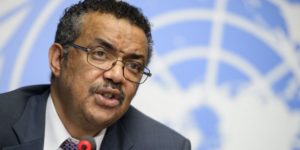Director-General of World Health Organisation (WHO), Tedros Ghebreyesus, has expressed concern over imminent food insecurity in the Horn of Africa due to climate crisis.

Ghebreyesus said this during an online news conference, saying that climate crisis is a major factor determining human health outcomes.
He added that climate crisis, which prolonged drought in the greater Horn of Africa, has already driven a wave of hunger, migration and disease, putting a major strain on health services.
Ghebreyesus said: “This year, nearly 60 million people will face food insecure across the greater Horn of Africa, which includes Djibouti, Ethiopia, Kenya, Somalia, South Sudan, Sudan and Uganda.
“Over the coming months, we expect a range of extreme weather events, including drought, flood, hurricane, and heat wave, all of which harm human health.
“El Niño, which has now been announced by the World Meteorological Organisation, together with global warming is already driving record temperatures.”
The WHO boss said that, on June 3, the world recorded its hottest day ever on record.
On malaria, he said he was pleased that, together with Gavi and UNICEF, the origination announced the allocation of 18 million doses of the RTS, S vaccine to 12 countries in Africa.
According to Ghebreyesus, with the climate crisis changing weather patterns, mosquitoes that carry diseases are increasing in density and spreading further afield.
“Malaria remains one of Africa’s deadliest diseases, killing nearly half a million children under the age of five every year, and accounting for approximately 96 per cent of global malaria deaths in 2021.
“As the first vaccine against malaria, the RTS,S vaccine has now been delivered to more than 1.6 million children in Ghana, Kenya and Malawi,’’ he said.
Ghebreyesus said it has been shown to be safe and effective, resulting in substantial reduction in severe malaria and a fall in child deaths.
According to him, other positives worth noting is that at least 28 African countries have expressed interest in receiving the RTS,S vaccine.
Ghebreyesus said that a second vaccine is currently under review for pre-qualification and, if successful, it would provide additional supply in the short-term.
By Franca Ofili
